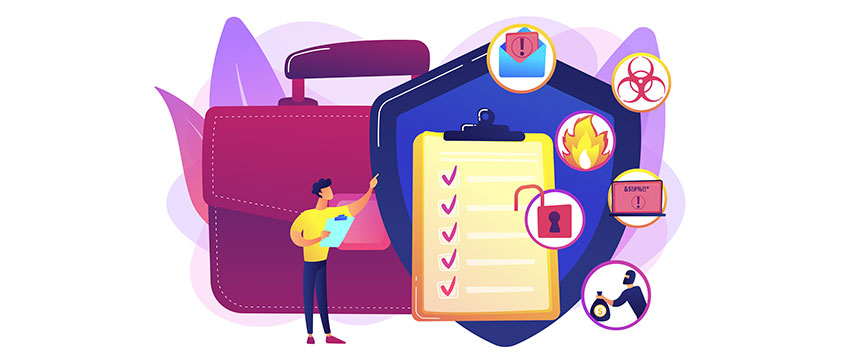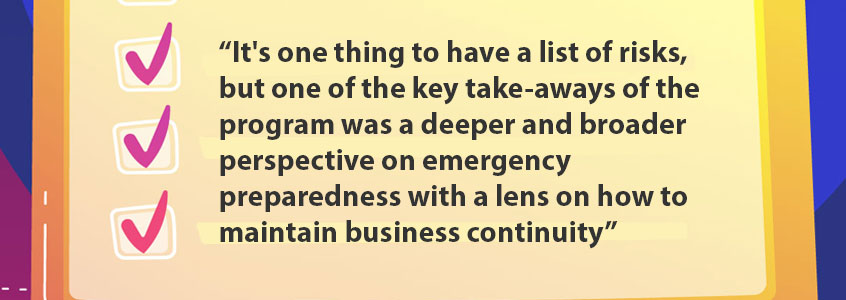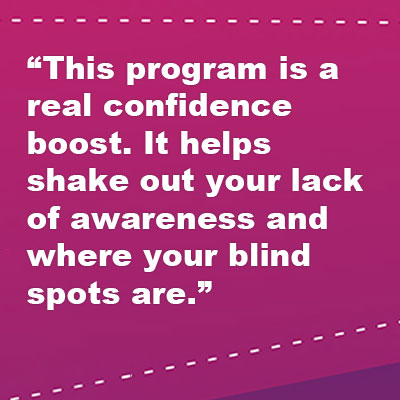Home / Health, Wellness and Safety / News / Talking EMOC with student Jonny Morris
Talking EMOC with student Jonny Morris

We recently caught up with Jonny Morris to ask a few questions about his experience in our Emergency Management for Organizational Continuity (EMOC) program. Here is what he said:
Why were you interested in taking the EMOC program? What were you hoping to get from it?
I work as CEO for Canadian Mental Health Association, BC Division and we are a large and complex provincial non-profit organization. We, of course, have ways of monitoring and managing risk, but in the middle of the pandemic, we wanted to have new tools and access to the latest thinking in risk management. It's one thing to have a list of risks, but one of the key take-aways of the program was a deeper and broader perspective on emergency preparedness with a lens on how to maintain business continuity. Also, given the area I work in, the psychological aspect of all of this.
And as a senior leader, accountable to a board of directors, I was looking for skills in how to build a culture within our board and organization of being as prepared as possible and with a lens towards business continuity. We're a critical organization, serving thousands of individuals each year, so I was very keen to learn not only the theory of how to do this, but practically, what you need to do to put this all in place, how to communicate it and how to support the culture change for being as prepared as possible as an organization.

When initially considering taking a course or program, what were the key factors that were important to you?
I went in unsure what a continuing studies program would be like. So my considerations were, of course, time and energy and those pieces. What kind of commitment will this take? Is it just going to be superficial? Will I get enough out of it? But I trust UVic incredibly, having gotten two of my degrees there—I know it's a credible and formidable institution of learning. The other thing I was looking for was good alignment with my job. There’s lots of training I can do and this has actually piqued my interest in thinking "could I go and do more in this space?" I was really looking for an applied experience and that absolutely is a big part of this course. As someone who leads an organization, you want this kind of thing to be useful and meaningful.
Why did you decide to register in the EMOC program vs. others offered elsewhere?
I did look into other options but ultimately I go to places I trust and UVic is absolutely one of those places, as an alum.
What did you enjoy or appreciate most about the EMOC program?
The commitment to best practice and the latest evidence in emergency management. Great instruction and I appreciated the benchmark of excellence in the program.
What most surprised you about the program?
The valuable readings and compelling assignments. I was pleasantly surprised.
How has the EMOC program helped you achieve your goals?
Already in my own practice, I have become better at assessing, managing and profiling risk for my board of directors. It has supported the decisions I've made recently in regards to the roles within our organization; we now have a Director of Operations Risk and Compliance who is charged with creating and implementing an emergency preparedness committee. It's helped me to realise some of my operational goals, particularly around strengthening, reinforcing, and improving how an organization as complex as this, grapples with risks that can have minor to devastating consequences to what we do.
Who would you recommend the EMOC program to? Who do you think would benefit from taking it?
I think a range of people [would benefit from it]. A number of people in the course were Occupational Health and Safety or municipal folks, but I think there is real space for the non-profit sector to benefit from something like this. Anyone who is concerned about keeping organizations sustainable and resilient in managing what is arguably a very complex world. None of us saw the pandemic coming so it's the best time right now, particularly with the ongoing impacts of the pandemic and climate change and the fact that we live in an earthquake zone, plus all the other risks we have to deal with—privacy breaches, and what have you. This is a great invitation to come and be prepared and not wait until you're in a crisis moment.
This program is a real confidence boost. It helps shake out your lack of awareness and where your blind spots are.

More About Jonny...
 Jonathan (Jonny) Morris currently serves as CEO of the Canadian Mental Health Association BC Division after almost two years in the public service working for the Ministry of Mental Health and Addictions, where he played a key role in helping build this new Ministry from the ground up, eventually leading the Policy and Legislation Branch as Senior Director. In this role, Jonathan was responsible for providing advice on a range of complex policy and legislative initiatives, while leading several transformational mental health and addictions programs.
Jonathan (Jonny) Morris currently serves as CEO of the Canadian Mental Health Association BC Division after almost two years in the public service working for the Ministry of Mental Health and Addictions, where he played a key role in helping build this new Ministry from the ground up, eventually leading the Policy and Legislation Branch as Senior Director. In this role, Jonathan was responsible for providing advice on a range of complex policy and legislative initiatives, while leading several transformational mental health and addictions programs.
In his past role at the Canadian Mental Health Association, Jonathan provided leadership for provincial mental health and substance use operations through the Association's provincial office and the branch network across British Columbia. His work focused on addressing systemic disparities between physical and mental health, campus mental health, the criminal justice system, systems transformation, policy and government relations.
Jonathan has a long research and practice history in suicide prevention, has trained as a counsellor, and has held sessional teaching appointments at the University of Victoria and Douglas College in Child and Youth Care.
- Posted August 22, 2022
Visit Registration
2nd Floor | Continuing Studies Building University of Victoria Campus 3800 Finnerty Road | Victoria BC | CanadaTel 250-472-4747 | Email uvcsreg@uvic.ca
2026 © Continuing Studies at UVic
Legal Notices |
Sitemap

